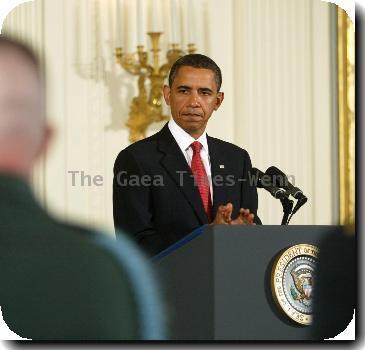A week ago, Obama planned his health care victory tour _ shaken, he’s forced to reassess
By Ricardo Alonso-zaldivar, APSaturday, January 23, 2010
Obama hunkers down as health care falters
WASHINGTON — Cool and confident, President Barack Obama basked in applause as he promised jittery Democratic lawmakers a coast-to-coast health care victory tour to sell the bill’s benefits upon its passage.
It seemed like a foregone conclusion at that point, just over a week ago. Now a rebuke from voters in Massachusetts has brought Obama’s health care overhaul to a defining moment. Having reached closer than any president to making health-care-for-all part of the social safety net, Obama may yet see his goal slip away.
The loss of their 60th Senate seat on Tuesday night in Massachusetts struck fear into Democrats. The president, who two weeks ago was driving deals to settle disagreements among House and Senate Democrats, sent mixed signals this past week that betrayed a lack of certainty about his intentions.
Old divisions resurfaced, leaving Democrats confused and frustrated.
Obama on Friday sought to recover his equilibrium. “I didn’t take this on to score political points,” a defiant Obama told workers in recession-weary Ohio. “And I’m not going to walk away just because it’s hard. We’re going to keep on working to get this done — with Democrats, I hope with Republicans — anybody who’s willing to step up.”
Step up. That’s what some Democratic lawmakers are saying Obama needs to do.
“I think he has got to get even more deeply involved,” said Rep. Elijah Cummings, D-Md. “He’s a key factor and we have to see exactly to what degree he wants to play that role.”
“He has the ability to bring us all together,” said Sen. Christopher Dodd, D-Conn., one of the negotiators in recent White House talks. “He did that … to try to resolve the differences between the House and Senate. Again, it’s going to take that kind of leadership.”
Associated Press reporters interviewed lawmakers and other important players to reconstruct a pivotal moment for Obama’s signature issue — and his presidency.
SO NEAR
Detached and cerebral Obama was not. Two weeks ago, the president cut through the mind-numbing details of the 2,000-page Democratic health care bills to find workable compromises.
Summoning House and Senate leaders to the White House, Obama sat them down to settle their major remaining differences. Among the issues: a Senate tax on high cost insurance plans deeply opposed by labor, and a strong desire by House lawmakers to make premiums more affordable.
Obama listened to each side, but kept pushing lawmakers to find middle ground, participants said. He made rapid progress, working past midnight as he also coordinated the U.S. response to the earthquake in Haiti. A deal was reached on the insurance tax.
A week ago Thursday, Obama went to the Capitol to address House Democrats at their issues retreat. He beamed with optimism.
“It’s reform that finally offers Americans the security of knowing that they’ll have quality, affordable health care whether they lose their job or change their job or they get sick,” he said. “And that’s why I’ll be out there waging a great campaign from one end of the country to the other, telling Americans with insurance or without what they stand to gain.”
Things were about to change.
That same day, a public poll showed Republican Scott Brown overtaking Democrat Martha Coakley in Massachusetts, with the race to succeed the champion of health care — the late Edward M. Kennedy— too close to call.
Political alarms went off at both ends of Pennsylvania Avenue even as the health care talks were close to concluding. By Friday a week ago, Obama and the congressional leaders were down to final options on the major disputes. The White House also scheduled a last-minute trip by Obama to try to save Coakley’s campaign.
Last Sunday, as Obama campaigned in Massachusetts, White House aides and their allies began floating a fallback plan if Coakley were to lose, depriving Democrats of undisputed control over the Senate. Audaciously simple, it called for the House to swallow hard and pass the Senate bill, maybe fix it later.
DISARRAY
The scene Tuesday evening in the cavernous meeting complex beneath the Capitol was like a mirage. House leaders were briefing Democrats on progress at the White House talks the week before. It would be rendered moot by the results from Massachusetts.
Lawmakers came to work Wednesday morning facing a new reality. Democrats no longer had the votes in the Senate to keep Republicans from blocking the health care bill, and the rest of Obama’s agenda. With the loss of Kennedy’s seat, Obama seemed to retreat — and stumble.
In an interview with ABC News, the president who only days before had been functioning as nightshift foreman of the health care talks said it wasn’t his role to delve into the details of legislative strategy. He suggested lawmakers might want to regroup around a smaller package of popular measures.
With House Speaker Nancy Pelosi, D-Calif., trying to gauge support for passing the Senate’s bill, Obama’s candor unnerved White House aides, who scrambled to reinterpret their boss’ remarks.
It was no use. After meeting with Democratic lawmakers Thursday morning, Pelosi delivered the news that she didn’t have the votes to pass the Senate bill.
Suddenly every Democrat had his or her own idea about what to do next. Some wanted to move on, noting that jobs and the economy are more important to voters than health care. Many called for scaling back the bills to more manageable and understandable dimensions. Some demanded a heroic attempt to enact comprehensive changes.
Old divisions broke into the open again.
Not two weeks ago, Pelosi was close to a final handshake with Senate Majority Leader Harry Reid, D-Nev. By Thursday, she dismissed the Senate bill as a nonstarter tainted by backroom deals. Reid complained that the House doesn’t listen to him. Pelosi huffed that the House, unlike the Senate, doesn’t have surprise elections.
By Friday, Obama was back to arguing that comprehensive health care legislation remains the best route for the nation.
Democrats are now in a self-imposed cooling off period of uncertain duration. No decisions have been made on how to salvage health care.
“This was always threading a needle,” said Dodd.
The irony, he went on to say, is that the loss of Kennedy’s seat has brought Democrats to their current predicament. Dodd said he wouldn’t want to go visit Kennedy’s grave at Arlington National Cemetery right now, as he did on Christmas Eve when the Senate passed its version of the bill.
“I’m afraid he might pop out at me.”
Associated Press writers Chuck Babington and Alan Fram contributed to this report.
On the Net:
White House: www.whitehouse.gov/issues/health-care
Tags: Barack Obama, District Of Columbia, Government Regulations, Haiti, Health Care Reform, Industry Regulation, Massachusetts, Medical Tourism, North America, Political Issues, Political Organizations, Political Parties, United States, Washington





